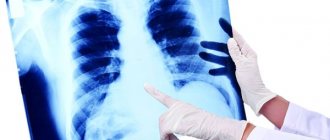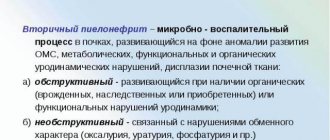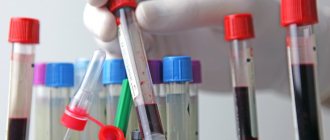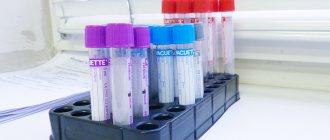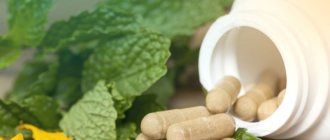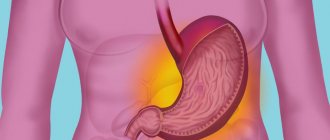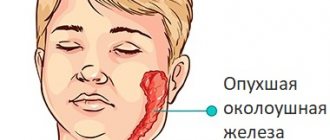A feeling of burning, fullness in the projection of the stomach, behind the sternum, spreading upward, often accompanied by a feeling of bitterness or acidity in the mouth, is called heartburn. It occurs as a result of the reflux of acidic gastric contents into the esophagus. It may be one of the manifestations of a gastrointestinal tract disease: gastroesophageal reflux disease (GERD), gastritis, duodenitis, cholecystitis, gastric ulcer, duodenal ulcer, etc. It is observed in cases of violation of the diet and/or nature of nutrition, and certain nervous disorders.
Heartburn occurs due to the reflux of stomach contents into the esophagus
Causes of heartburn
One of the main causes of discomfort is high acid content in the stomach. Heartburn occurs much less frequently in women and men if the mucous membrane of the digestive organs is highly sensitive. Also, the causes of irritation in adults include addictions and consumption of low-quality or harmful foods. So, heartburn can be caused by:
- Eating food in excessive quantities. Constant overeating contributes to an increase in stomach volume, which in turn leads to an increase in acidity levels.
- Bad habits. Smoking and drinking alcohol greatly irritate the mucous membranes of the digestive organs.
- Drinking carbonated drinks and coffee in large quantities. These products are also irritants to the mucous membrane.
- Consumption of certain categories of products. Floury, fatty, spicy, salty - all this affects the acidity of the stomach.
- Taking certain categories of drugs. Ibuprofen, aspirin and some other pills also increase stomach acid levels.
- Excessive physical activity. Intense exercise, heavy lifting, and severe stress affect the redistribution of blood throughout the body. During physical activity, it flows into the muscle tissues so that they have enough energy. It is this process that causes some digestive disorders.
- Mental disorders. Constant lack of sleep, neuroses, and stress negatively affect not only the digestive system, but also the body as a whole.
Pain due to possible diseases
How to understand that a burning sensation in the chest occurs due to illness. A clear sign that there is a pathology in the body is the manifestation of pain. Pain can occur with the following diseases:
- Chronic gastritis. Most often, a burning sensation accompanied by pain occurs an hour or two after eating. This manifests itself due to the reflux of undigested masses containing hydrochloric acid into the esophagus.
- Inflammation of the duodenum 12 – duodenitis. With this disease, pain can be felt constantly. If the diet is not followed, heartburn is a companion to the disease, and bloating is also a concern.
- Cholecystitis. The gallbladder very often becomes inflamed when stones appear in it. Pain on the right side of the abdomen, accompanied by heartburn, is felt after eating fatty foods or strong shaking.
- The occurrence of ulcers is accompanied by both pain and a burning sensation in the chest.
- Hiatal hernia. A chronic disease that causes a defect in the esophageal opening. With this disease, a section of the esophagus may shift through the enlarged opening of the diaphragm into the sternum. Pain occurs in a horizontal position or while bending down.
- Heartburn as a sign of gastroesophageal reflux disease occurs due to frequent reflux of stomach contents into the esophagus. The effect of acid on the mucous membranes causes pain.
- Disorders of the food digestion process. They may appear most often in young people due to problems with the gallbladder, stomach or intestines. The reason may lie in the production of large amounts of hydrochloric acid.
Symptoms
Typically this illness manifests itself with the following symptoms:
- a bitter or sour taste appears in the mouth;
- belching of air occurs;
- a burning sensation appears behind the sternum, which can spread up and down the esophagus;
- unpleasant sensations intensify if a person takes a lying position or begins to bend over.
Medicines for gastritis and heartburn
Complex therapy using the following medications helps well in treatment:
— enveloping drugs (Smecta);
- antacids (to reduce acidity levels);
— enzymes (to normalize digestion Mezim, Pancreatin, Festal, etc.);
— painkillers (No-shpa or Spazmalgon);
- medications that restore the gastrointestinal mucosa (Calefron, Solcoseryl);
- laxatives (in case of constipation);
- for flatulence (bloating), Simethicone or dill water is prescribed;
- antibiotics (in the presence of various types of bacteria in the gastrointestinal tract, they have an enveloping effect on them and are safely removed from the body);
— in case of psychoemotional disorders, the patient is prescribed sedatives (Fitosed, Glycine).
Getting rid of gastritis is impossible without regularly taking medications prescribed by the doctor, which should be taken by patients of any age, even small children with inflammation of the gastric mucosa. You cannot independently prescribe any medications for yourself or your child to stop the burning sensation, as this can cause irreparable harm to your health.
It is necessary to consult a qualified doctor, who will definitely prescribe the necessary medications - antacids. They drink them for medicinal and preventive purposes. This group of useful drugs has some disadvantages. These include the following:
- prohibited for pregnant women and nursing mothers;
What does regular heartburn indicate?
If such discomfort occurs constantly, for example, after every meal, this may indicate the presence of a serious disease of the digestive system. The list of diseases, a symptom of which is frequent heartburn, is quite extensive, here are the main ones:
- chronic gastritis (this disease is almost always accompanied by constant heartburn);
- cholecystitis (usually accompanied by constant heartburn and stomach pain);
- duodenitis (discomfort appears in case of violation of a special diet);
- stomach ulcer;
- hernia.
What is gastritis
The inflammatory process that occurs on the surface of the gastrointestinal mucosa is called gastritis. Sometimes, the patient experiences very severe pain in the epigastric region that is impossible to tolerate. To get rid of it, the patient takes painkillers such as Spazmalgon or No-shpa. While relieving pain, they are unable to completely cure the disease.
Heartburn literally haunts the patient, being a constant companion of gastrointestinal diseases. Its occurrence is associated with increased acidity in the stomach, the official name of heartburn is “pyrosis”.
Diagnosis of heartburn
In cases where heartburn in men and women becomes pathological, it is necessary to conduct a diagnosis to identify the characteristics of the disease. It includes:
- Studying the patient's testimony regarding the occurrence of burning (when did heartburn appear, how often does it occur, was there any connection between its occurrence and the intake of certain products, are there any ailments accompanying it, etc.).
- Studying the patient’s medical record and the history of his diseases (to find out about the presence or absence of diseases of the digestive system or excretory organs).
- General urine test (to identify the presence or absence of pathologies).
- General blood test (to determine the level of hemoglobin and other elements involved in blood function processes).
- Test to determine stomach acidity.
- EGD (a procedure that allows a doctor to examine the digestive organs from the inside using an endoscope, assess their condition and identify the presence of pathologies).
- Impedance measurement of the esophagus (allows you to find out the acidity of the esophagus).
- Examination of gastric tissue for the presence of bacteria.
- Ultrasound of the digestive organs (to detect tumors).
Relief from heartburn during pregnancy
Pregnancy is one of the obvious causes of heartburn in women. Reflux develops due to increased intra-abdominal pressure. If a woman experienced periodic episodes of heartburn before pregnancy, the symptoms tend to worsen. Throughout the entire period of gestation, the uterus increases in size, which leads to some displacement of the stomach and restriction of intestinal peristalsis.
Treatment of heartburn in pregnant women includes a complex of non-drug methods and medications. Moreover, for effective and lasting relief of undesirable effects, sometimes just following a diet is enough. Necessary measures:
- Proper nutrition.
- Positional therapy.
- Sleeping on the left side.
- Sufficient consumption of pure water.
- Replacing fresh bread with toast or white bread croutons.
- The use of drugs from the group of non-absorbable antacids (Rennie, Gastal, Phosphalugel, Maalox, Almagel).
If you follow all medical recommendations, monitor your diet and level of physical activity, heartburn will not have a chance to exist. Of course, in the absence of chronic gastrointestinal pathologies.
How is heartburn treated?
The most important factor provoking the occurrence and development of any disease is lifestyle. That is why, first of all, you need to normalize your daily routine and diet, as well as get rid of bad habits. Only in conjunction with the normalization of lifestyle is drug treatment used.
Drug treatment
Traditionally, antihistamines, inhibitors, antacids or prokinetics are used to treat heartburn. The most common of them are antacids, for example:
- Smecta
- Phosphalugel
- Almagel.
If this treatment does not work, you can try using Cimetidine or De-nol . The most preferred form of application is gel.
These medications help get rid of heartburn itself, but do not eliminate its causes. In order to normalize the structure of the mucous membranes, drugs from a different drug group are prescribed. It could be:
- Cimetidine;
- Ranitidine;
- Famotidine.
For complex treatment of the digestive system, proton pump blockers are usually used, for example:
- Rabeprazole
- Pantoprazole
- Esomeprazole.
To tone smooth muscles, Domperidone and Cerucal .
In parallel with the above-mentioned drugs, sorbents are usually included in the course of treatment (to reduce the formation of gases):
- Activated carbon;
- Polysorb;
- Lactofiltrum.
And preparations with enzymes:
- Pancreatin;
- Creon;
- Festal.
Surgery
In cases where medications are powerless to eliminate heartburn, the patient may be prescribed surgery. It is indicated if, as a result of monitoring the patient, disturbances in the functioning of the sphincter have been identified.
The operation can be performed using the classical method or using laparoscopy. The second method causes less damage to the body and also reduces the likelihood of complications after the intervention.
Alternative methods for treating heartburn at home
Along with drug and surgical treatment of the disease, there are always unconventional methods that help relieve the symptoms of heartburn without leaving home.
Before using any alternative method, it is worth remembering that such methods do not provide any guarantees, therefore, all responsibility for the final result of treatment lies solely with the patient. So, how to get rid of heartburn at home?
Nutrition and supplements
The most common alternative nutritional remedies for heartburn are:
- Using baking soda. You can eliminate heartburn with soda by diluting a quarter teaspoon of baking soda in a glass of warm boiled water. Drink the resulting mixture slowly in small sips. It is advisable to do this before the water stops being warm.
- Potato juice will help eliminate the unpleasant burning sensation. It should be prepared only before use (not in advance!), preferably from young pinkish potatoes. The tubers must be thoroughly washed, peeled and all eyes removed. Then the potatoes need to be grated on a fine grater and squeezed through cheesecloth. The resulting juice should be allowed to stand for several minutes (no more than three) for the starch to settle. It is important not to expose the liquid to air, as already in 4-5 minutes the product will begin to oxidize, the juice will darken and lose its nutritional properties.
Treatment of heartburn
By eliminating the cause, you can defeat the unpleasant phenomenon. Many men at first prefer a soda solution, but this treatment for heartburn is not entirely correct, since frequent use of soda causes a disturbance in the water-salt balance of the body. If you experience regular burning sensations, it is recommended to consult a doctor who can select more effective medications that will cope with heartburn and will not cause harm to the body or cause irreversible consequences.
Traditional methods of treatment
If the causes of the unpleasant symptom are not serious, it can be treated with folk remedies:
- Apple cider vinegar after a meal is good at extinguishing stomach acid;
- Tincture of dill, wormwood and caraway seeds;
- Potato juice or raw potatoes;
- Walnuts – recommended for prevention;
- Warm milk has a beneficial effect on the stomach;
- Vegetable oil, enveloping the walls of the stomach, does not allow the release of acid;
- Apples and carrots;
- A solution based on mineral water and baking soda - half a teaspoon of baking soda per glass of clean water;
- Eggshell;
- Activated carbon;
- Herbal tea made from ginger root, flax seeds and dill relieves the disorder;
- Herbal mixture of yarrow and St. John's wort - the ingredients must be mixed in equal proportions, brew 4 tbsp. herbs in a liter of boiling water and leave. Take half a glass three times a day.
All heartburn remedies reduce the acidity and aggressiveness of gastric juice entering the esophagus. In medicine there are 2 groups of such drugs: antacid and antisecretory drugs.
Antacids are used to neutralize the hydrochloric acid of the gastric juice and improve the condition in which the burning sensation decreases or disappears for a certain time, but then reappears. The drugs do not act on the disease itself. Antacids are absorbable (baking soda, Tums, burnt magnesia, Rennie, Bourget's mixture and calcium carbonate), and non-absorbable (Gaviscon, Phosphalugel, Gastal, Almagel, Maalox).
Antisecretory drugs are used not only to neutralize hydrochloric acid, but also block its production. This group of drugs belongs to pathogenetic treatment, as it is aimed at treating the underlying disease. There are 2 groups of drugs: H2 blockers - histamine receptors, which block receptors in the gastric mucosa and the formation of acid, and proton pump inhibitors, which suppress the formation of hydrochloric acid.
H2-histamine receptor blockers include: Cimetidine, Famotidine and Ranitidine.
Proton pump inhibitors include: Omeprazole, Pantoprazole and Lansoprazole.
In order not to provoke heartburn, it is advisable to eat right and follow simple recommendations:
- do not eat two hours before bedtime;
- eat small portions, but often;
- chew food thoroughly;
- After lunch, do not take a horizontal position for 30 minutes;
- drink two liters of water per day.
Preventing heartburn
To prevent the recurrence of heartburn in the future, you must adhere to a certain diet and general recommendations:
- First, you need to distribute your meals so that you eat regularly at the same time. This is due to the fact that the body gradually gets used to eating at a certain period of the day and “prepares” for this time by secreting enzymes. If food does not enter the stomach, it begins to “digest itself,” which causes heartburn and pain.
- Secondly, there should not be too much time between breakfast, lunch and dinner. The optimal distribution is 3-4 hours between main meals. In addition, small snacks should be included in your diet.
- Thirdly, any product must be chewed thoroughly and not rushed while consuming it.
Prevention of heartburn involves consuming the following foods:
- Oatmeal, millet and barley cereals. These cereals have an excellent effect on the stomach and do not irritate the mucous membranes.
- Boiled eggs and chicken fillet. They do not provoke an increase in acidity levels and saturate the body for a long time.
- Vegetable soups, juices and broths.
- Milk and fat cottage cheese.
The prevention diet cannot include foods that cause heartburn:
- Flour products with a high yeast content. Such products cause irritation of the walls of the stomach through fermentation, which causes a burning sensation in the esophagus.
- Citrus and sour fruits. Kiwi, pineapple, apple and other foods of this type can dramatically increase the level of acid in the stomach.
- Spicy or highly seasoned dishes. Severely irritate the mucous membrane of the digestive system.
- Salty, smoked and fatty foods. Also classified as irritating factors.
- Coffee and coffee drinks in large quantities.
Features in pregnant women
When and how heartburn may manifest itself during pregnancy is of interest to every expectant mother. During this period, physiological and hormonal changes occur in a woman’s body. Most often, the burning sensation appears after eating.
This sensation may only last a few minutes, but sometimes it lasts for hours. In the second half of pregnancy, heartburn worries almost every woman.
Factors influencing the occurrence of heartburn in pregnant women:
- During pregnancy, a woman's body produces the pregnancy hormone progesterone. It is worth noting that this substance in men is produced by the testicles and in some quantities by the adrenal glands. Thanks to its effects, the menstrual cycle stops during pregnancy. It promotes the growth of the uterus and prevents its muscles from contracting. However, at the same time, progesterone relieves the level of smooth muscle tension, including relaxing the sphincter. In this regard, gastric juice may end up in the esophagus, which causes a burning sensation in the chest area.
- In this state of the body, many women begin to eat heavily. Intra-abdominal pressure causes a reverse effect on the sphincter.
- Due to the fact that the level of hormones in a woman’s body is very high, the digestion process is slow. Changes in muscle contractions lead to slow movement of eaten foods through the esophagus. Prolonged digestion leads to a burning sensation in the chest and changes in stomach activity.
- The growing fetus puts pressure on the stomach, causing intra-abdominal pressure to increase.
When carrying a child, a burning sensation behind the sternum is a fairly common factor. However, if the signs were present even before conception, and during pregnancy it causes a lot of problems, then it is necessary to visit a doctor and check the internal organs.
Consequences of heartburn
If discomfort occurs very rarely, there is no need to worry. Most likely you have consumed some foods that cause heartburn.
If the problem has become regular, and constant heartburn after eating seriously interferes with life, you should immediately consult a doctor, since heartburn can be pathological in nature and indicate the presence of a serious disease: from gastritis to esophageal cancer.
In any case, you need to listen to your body and monitor its condition. It is important to remember that timely identified symptoms and treatment that is selected promptly and correctly will help maintain health for many years.
Increased acidity
When the stomach produces excessive amounts of acid, a burning sensation may occur, causing irritation of the mucous membrane and tissue damage. Excess acid in the body can cause disruption of the normal functioning of the digestive system. At the same time, foods containing acid are necessary for good digestion of food and absorption of nutrients that come with it.
About the weakness of the cardiac sphincter
The cardiac sphincter is a muscular flap located at the junction of the esophagus and stomach. Refluxes occur due to poor functioning of this valve. As food moves toward the intestines, the sphincter opens to let it through. Its frequent opening leads to the fact that some of the food can return to the esophagus, causing heartburn, which is felt by a person immediately after eating.
The dangers that heartburn can pose
When wondering why heartburn is dangerous and what potential threat it poses, it is worth remembering that this symptom is an aggravating irritant that can cause deterioration in well-being and general health.
Heartburn itself is not dangerous. The causes and consequences of each type of heartburn are purely individual. If you consider that the symptom was caused by a harmful product that was eaten the day before or by sweet soda, then you should not worry too much and think about heartburn tormenting you. You should simply drink still water or use medications specifically designed to combat this symptom.
When figuring out whether you can somehow die from heartburn, you should again remember that this symptom is a warning signal indicating a malfunction in your body. You won't die from heartburn itself, but a disease that causes a constant burning sensation can be fatal. So, the symptom manifests itself in such dangerous diseases:
- For pancreatitis;
- For cholecystitis;
- For stomach cancer;
- For ulcers;
- For gastritis;
- For cholelithiasis;
- Other.
Heartburn with pancreatitis, as with any other gastrointestinal disease, requires a strict diet and urgent consultation with a doctor. You should not delay visiting the clinic, since heartburn with pancreatitis can easily lead to an exacerbation of the disease and irreversible complications.
Factors that increase the likelihood of gastroesophageal reflux and heartburn [edit | edit code]
Heartburn often increases after chocolate, coffee, strong tea, mint, fatty foods, citrus fruits, hot or alcoholic drinks. Factors that provoke heartburn are overeating and eating less than 2-3 hours before bedtime. Overweight people are more likely to suffer from heartburn. Smoking tobacco products stimulates the secretion of acid in the stomach and also helps to relax the lower esophageal sphincter. Heartburn occurs more often when the patient's body is horizontal, as well as when the body bends and bends. Heartburn can be caused by tight clothing that tightens the stomach. Having a hiatal hernia also slightly increases the likelihood of heartburn. [3] [5]
On empty stomach
Prolonged, uncontrolled fasting does not benefit the body - the digestive system suffers greatly from this. When it’s time to eat, the gastrointestinal tract prepares to process food: they secrete gastric juice and form bile. If the body does not receive food over and over again, attacks of burning gradually begin to appear. Without food, the juice breaks down surrounding tissue, including the esophagus. Heartburn on an empty stomach – causes:
- involvement of the esophagus in the inflammatory process;
- weakening of the lower esophageal sphincter.
Causes and symptoms
What disease causes heartburn? Burning sensation in the esophagus occurs for various reasons:
- Eating and lifestyle disorders. Excessive consumption of alcohol, fatty, salty foods can lead to burning pain in the chest. This symptom can be observed in lovers of chocolate, citrus fruits, tomatoes and sweet carbonated drinks.
- Excess weight, smoking and wearing tight clothes with tight belts.
- Psycho-emotional stress, nervousness, regular bad mood.
- Taking certain medications to relieve inflammation in the body.
- Pregnancy. Often, changes in hormonal levels and long-term fetal pressure on internal organs provoke heartburn.
Another cause of burning pain behind the sternum and along the esophagus is various diseases in the stomach. What disease is heartburn a symptom of and how are they related? This worries many people, and to get the answer, you should consider each gastrointestinal disease separately.
Symptoms of the disease
The feeling of specific discomfort in the stomach is difficult to confuse with anything else. Heartburn appears with a burning sensation in the upper abdomen or heat in the epigastric region, after which the person feels a rise in these symptoms higher in the throat. In the depths of the oral cavity, an unpleasant acid is felt, irritation from gastric contents, small pieces of undigested food. In addition, the signs of the disease are complemented by other uncomfortable sensations:
- nausea;
- airy belching with a sour odor;
- vomiting may occur;
- belching with bitterness or acidity;
- increased salivation;
- burning pain radiating under the shoulder blade and neck;
- hoarseness, cough;
- problems with swallowing;
- the presence of a “coma” in the throat;
- diarrhea.
Advice! Symptoms of pathology can often be associated with provoking factors. Patients note that some people experience a burning sensation in the stomach from water, cottage cheese, coffee, or after smoking a cigarette. In this case, it is necessary to reduce and moderate the consumption of these products.
With high acidity, raw cottage cheese may be prohibited for patients, and water should be drunk in small sips, and not in one gulp. You will have to give up coffee - it can be replaced with coffee drinks, cocoa, chicory, and it is better to quit smoking altogether.
At night
Many factors can contribute to the appearance of symptoms in the evening or at night. Night heartburn - causes:
- binge eating;
- constant abuse of coffee, alcohol, soda;
- smoking after dinner;
- frequent stress;
- pregnancy;
- spicy, fatty foods;
- taking medications;
- physical activity immediately before meals;
- weak muscles responsible for moving food to the esophagus;
- obesity;
- eating large amounts of sweets, such as chocolate;
- adding peppermint to the drink;
- gastrointestinal diseases.
After gallbladder removal
The operation is carried out to improve the quality of life of people, but often its consequences are burning pain in the throat and belching of air. What are the causes of heartburn after gallbladder removal? After surgery, bile begins to flow into the small intestine, even if there is no food there. Gradually it acts on the mucous membrane of the organ, on the sphincter, weakening the muscles. For this reason, the obturator function of the esophageal organ decreases. In addition to bile, the occurrence of the disease is influenced by the forced use of anti-inflammatory drugs.
Symptoms characteristic of heartburn
The occurrence of esophagitis is associated with the reflux of acid from the stomach into the digestive tract. The main sign of heartburn is a burning sensation behind the chest, in the middle of the costal arch. As the burning grows, it spreads to the larynx and shoulder.
In addition, with heartburn, belching with a pickled or bitter odor, vomiting, heaviness in the area of the xiphoid process, salivation appear, the cervical spine begins to hurt, and appetite disappears. The patient feels as if there is a lump in his larynx. Often with heartburn, coughing is observed, and speech becomes hoarse.
In a situation where heartburn is caused by a narrowing of the lower digestive tract, regurgitation is likely. In serious cases, vomiting may occur.
Esophagitis often occurs due to poor diet and lifestyle. If the disease manifests itself infrequently, there is no need to worry - most likely, the reason lies in low-quality products. It is necessary to follow a diet for some time and monitor your diet.
Prevention
It is impossible to prevent heartburn with 100% probability. However, there are preventive measures that can minimize the manifestations of heartburn and make attacks rare.
In order to completely get rid of heartburn, you must:
- stop smoking;
- stop being addicted to coffee;
- forget about fatty, heavy, difficult-to-digest foods;
- start eating 4-5 times a day in small portions;
- drink more clean water (recommended volume – 2 l);
- start playing sports or increase physical activity.
You need to go to bed 2-3 hours after eating so that the food has time to digest, and while sleeping, take a position on your left side.
If heartburn is an infrequent “guest”, these simple measures will help cope with it. But if it appears regularly and is accompanied by disturbances in well-being, do not rely on available remedies or treatment at home. Folk remedies will not get rid of the causes of the underlying disease. It is necessary to visit a doctor, examine the body and cure the disease.
Dangerous consequences and prevention
Failure to promptly diagnose and treat heartburn can lead to dangerous complications. Possible consequences of GER include:
- inflammation of the esophagus (esophagitis);
- scars and strictures of the digestive tract;
- erosions and ulcers of the esophageal mucosa, gastrointestinal bleeding;
- malignant degeneration of mucosal epithelial cells (Barrett's syndrome).
To avoid the development of cancer and chronic inflammatory processes, it is necessary to prevent heartburn, avoid stress, follow a rest and nutrition regimen, and also undergo regular medical examinations.
An increase in the frequency of heartburn attacks is an indication for immediate contact with a gastroenterologist.
What is chronic heartburn?
Jokes with health are bad; if the causes of heartburn are not eliminated, it begins to progress and entails the most dangerous complications. Over time, the patient begins to experience attacks of blood vomiting, severe chest pain, and dizziness. Other symptoms are possible: loss of consciousness, difficulty swallowing, dehydration, tarry stools, weight loss. All these are indicators of chronic heartburn, which must be treated in the hospital. A thorough examination will reveal the underlying causes of heartburn and help determine the necessary treatment options.
Why does heartburn happen?
Gastroesophageal reflux is the reflux of acidic stomach contents into the esophagus. Gastric juice consists of hydrochloric acid, enzymes, and other compounds harmful to the esophagus. Due to prolonged contact of the acidic contents of the stomach with the esophagus, its mucous membrane is damaged and the person experiences heartburn. But heartburn can appear not only due to increased acidity of the stomach, but also due to hypersensitivity of the mucous membrane of the stomach and esophagus with low acidity.
Most people describe heartburn as a burning sensation in the pit of the stomach that migrates up to the neck and throat. Some people experience a sour or bitter taste in their mouth. Unpleasant sensations can last for several hours and often intensify after eating or physical activity.
Depending on the frequency of attacks, there are 3 degrees of heartburn severity:
- I degree or moderate heartburn - attacks occur once a month;
- II degree or moderate heartburn - attacks occur once a week;
- III degree or severe form - heartburn occurs every day.
Diagnostics
The occurrence of heartburn for several days in a row is a reason to seek help from a specialist to identify the cause of the reflux of gastric juice into the esophagus. A gastroenterologist prescribes laboratory tests and instrumental examinations.
In case of disturbances in the functioning of the gastrointestinal tract, blood, feces, and urine are collected to determine possible infectious diseases and internal inflammatory processes. Instrumental examination involves X-rays, endoscopy, ultrasound examination of the abdominal organs, and pH acid analysis. The procedures performed allow us to identify the cause and prescribe effective treatment.
Diet for heartburn
What helps with heartburn? What foods should be included in the diet of a person suffering from this disease? First of all, we list the most important thing - a set of products that contain complex carbohydrates.
These include:
- Rice (especially brown);
- Bran (or corn) bread;
- Pasta made from durum wheat.
In addition to them, the diet should be supplemented with:
- Fruits (apples and bananas are especially useful);
- Lenten meat dishes and fish;
- Various cereals;
- Boiled eggs;
- Low-fat cottage cheese, cheese and sour cream;
- Green tea, non-carbonated mineral water and compote made from non-acidic fruit and berry raw materials.
But following a diet will not bring the desired results without fighting overeating.
Therefore, always eat food:
- Often (up to five to six times a day), but in small portions;
- Measured and leisurely, chewing food thoroughly and not swallowing large pieces;
- Have dinner no later than 19.00;
- For at least thirty to forty minutes following a meal, try not to lie down;
- Drink approximately two liters of clean water during the day, trying to evenly distribute the amount of liquid consumed per day.
Lifestyle changes[ edit | edit code]
Patients suffering from heartburn should try to make adjustments to their lifestyle and follow a diet. Avoiding the foods listed above, eating smaller portions but more frequently, avoiding eating before bed, reducing body weight, avoiding smoking and alcohol, avoiding tight clothing, and sleeping on a bed with the head of the bed raised can have a positive effect on the patient’s condition and reduce the number of episodes heartburn. [5]
Eat less, but more often (4-6 times a day). With this diet, the stomach will not be empty, which means it will produce less acid. You need to eat more slowly to slow down secretory activity. You should have dinner 3 hours before going to bed. Drink water after meals to clear your esophagus [1] .
In the morning
If bloating, burning pain and other unpleasant symptoms rarely bother you, most likely there is no pathology. If you are bothered every day, you should be wary and think about eliminating the causes. Why do I have heartburn in the morning? Causes:
- A heavy dinner before bed: The digestive system is less active at night, so food does not have time to digest.
- Gastrointestinal diseases: ulcers, gastritis, esophagitis, exacerbation of pancreatitis.
- Cancer of the esophagus, stomach.
- Impaired motor function of the stomach.
- Early and late pregnancy.
- Taking medications (hormonal, non-steroidal anti-inflammatory drugs, nitrates).
- Smoking.
Symptoms
The symptoms of heartburn are quite clearly defined and well known. But you should pay special attention to them, since symptoms can periodically change, becoming more pronounced and aggressive. The sensations of heartburn are not always expressed only as a burning sensation in the pit of the stomach and a sore throat. So, the main signs that additionally accompany stomach heartburn can be called:
- A burning sensation in the abdominal cavity or in the retrosternal region;
- Cough accompanied by acute pain;
- Obvious bitterness in the mouth;
- Pain in the back, chest, heart;
- Nausea;
- Vomit;
- Profuse sweating;
- Fatigue and loss of normal appetite;
- Problems with stool.
It should be remembered that the more complex a person’s set of symptoms of how heartburn manifests itself, bothering him day by day, the more serious the problem that requires immediate treatment. If the symptom begins to be accompanied by vomiting, nausea and indigestion, then it becomes obvious that treatment for gastritis, ulcers and much more may be needed.
Signs of heartburn may be difficult to detect at first. So, at first a person may be bothered by an insignificant burning sensation, tingling, accompanied by malaise and unpleasant belching. The regular nature of these symptoms clearly indicates that there have been disruptions in the gastrointestinal tract that cannot now be eliminated on their own. Heartburn after vomiting signals a malfunction of the lower esophageal sphincter, as well as a disruption of the normal digestive process.
